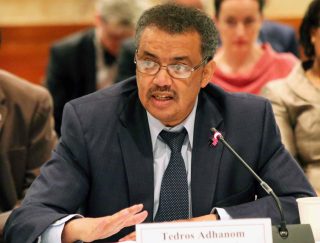On Thursday, the new WHO Director-General, Ethiopia’s Tedros Ghebreyesus appointed Mugabe as his organization’s ‘goodwill ambassador’. However, a few days later, he was clearly made to regret his decision after several WHO donors, human rights groups and governments expressed their concerns over the decision. In a statement he put out on Sunday, he said he “reflected on [his] appointment” of Mugabe, and so “decided to rescind the appointment”, effectively it. As expected, this has raised questions about Tedros’ ability to lead the WHO and make a difference.
Justifying his original decision to make Mugabe a WHO ambassador, Tedros said last week that “Zimbabwe is a country that places universal health coverage and health promotion at the centre of its policies to provide health care to all”. The only thing is, this is not true. Zimbabwe’s health system is one of the worst in Africa, with it being obliterated to the point of non-existence by Mugabe’s policies. Zimbabwe’s 92-year-old leader has been president for 30 years and is quite popular for his many human rights violation and detrimental national policies. Zimbabwe currently has no National Health Insurance policy, has one of the highest infant mortality rates in the world and has 1.6 doctors per 10,000 Zimbabweans. Mugabe and his family regularly take trips outside the country for medical care, meaning he is no fan of his country’s healthcare system.
Tedros, a former Ethiopian Foreign Minister and Health Minister who was appointed as WHO head in May of this year, has since been categorized with “Africa’s old men” club; African leaders who have spent more time than needed in political offices while offering nothing new. He also seemingly employed the political patronage custom to the WHO, a practice commonly identified with African leaders. It is believed in some quarters that Mugabe’s appointment was reward for his support, as an African Union (AU) leader, in the nomination 0f Ethiopia and Tedros for the WHO job.
If the above reasons are true, they would surely put pressure on Tedros as the first African leader of WHO. His first major decision after his election has seemingly shown a lack of judgment and poor decision making on his part, despite apparently having weeks to come to that decision. Through this, he has shown that international organizations could be used as an avenue by Africans to launder the images of dictators on the continent, further putting the appointment of Africans into these organizations in danger.
For Tedros, changing perceptions about himself will be paramount now, given that future decisions from his office will be under much scrutiny. He could come good later, and this gaffe could really have been a genuine mistake on his part. In the bigger picture, Africa has a reputation for producing competent and efficient administrators for international organizations, and even if Tedros eventually looks like a wrong decision, he should be that rare exception and not the norm.








